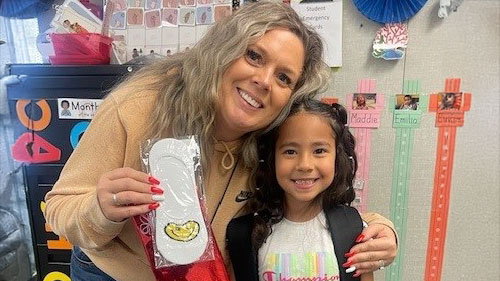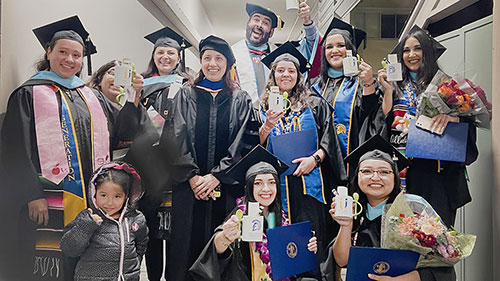


To our valued partners,
We are pleased to present you with the 2024 Annual Report for the California Commission on Teacher Credentialing. For 55 years and counting, the Commission
has served as the state standards board for educator preparation, licensure, professional practice, and discipline.
Our work plays a pivotal role in ensuring that California’s nearly six million students benefit from well-prepared,
diverse, and effective educators who foster inclusive learning environments and drive academic success.
This past year marked significant strides in the Commission’s efforts to increase teacher supply and produce systemic
improvements that range from developing resources for prospective teachers and advancing early childhood education to adopting new teaching standards and awarding funding for competitive grants.
The Commission’s work is driven
by a strategic
plan centered on equity, inclusion, and diversity in the classroom. We recognize that educators can be most effective when combining the science of learning with compassionate and creative educational practice.
The Commission appreciates
the state’s continued investments in programs and initiatives that help ease the teacher shortage and make earning a credential more affordable.
We extend our gratitude for the support of the Legislature, the Newsom Administration,
and our many partners who join a collective commitment to continuously improve educator excellence for California’s students.
Sincerely,
Marquita Grenot-Scheyer
Chair
Mary Vixie Sandy
Executive Director
Processed 339,112 applications in the 2023/2024 fiscal year, an 8.3% increase over the previous fiscal year.
Issued 14,636 new California teaching credentials in 2022-23 (as of April 1, 2024).
Opened 5,908 educator misconduct cases during 2023-24; action taken on 14% (852) of these cases.
Approved 20 new educator preparation programs.
Conducted accreditation site visits for 32 institutions.
Monitored 600+ education-related bills.

In California’s diverse and dynamic educational landscape, our efforts are increasingly urgent to support teacher recruitment, remove barriers, and increase access to the profession.
We continue to make important progress on the Roadmap to Educational Careers Initiative (Roadmap to Teaching) aimed at making it easier to understand pathways to become an educator and to address the state’s teacher shortage.
Assembly Bill 178 provided $1.4 million for the Roadmap to Teaching initiative that also allowed for the hiring of eight education career counselors. The Commission produced online resources that offer guidance on how to complete preparation and credential requirements, find a career path or employment opportunities, among other topics.
In 2024: We added information on financial support available for prospective teachers developed in conjunction with the State Collaborative for California’s Educator Workforce.
The Roadmap to Teaching landing page received more than 84,000 views, education career counselors responded to 2,439 appointment requests, and we attended 15 recruitment, retention, and hiring events.

In 2024: We completed the first State Teaching Workforce Dashboards in collaboration with the California Department of Education to highlight the preparation and assignments for teachers throughout California.
These easy-to-understand dashboards go beyond previous data that monitors outcomes such as number of misassignments, vacancies, and local assignment options. The dashboards deliver a snapshot of the educator workforce, including “fully
prepared” and “underprepared” educator assignments, and align with data presented by other state educational agencies.
The State Teaching Workforce Dashboards, pursuant to Senate Bill 114, will go live in early 2025 and serve as a valuable tool for local education agencies, policymakers, and advocates to assess the state of the teacher workforce.


The Commission administers state-funded grant programs that expand pathways to credentialing, support high-quality teacher preparation, and increase diversity of the education workforce. As such, we fund local education agencies to partner with educator preparation programs that provide financial support to teacher candidates.
In 2024: We awarded funding to 100 grant recipients across six grant programs. We also continued to administer and monitor 531 grant recipients across eight grants and determined that approximately 70%of participants in the residency and classified school employee grant programs are candidates of color.
The impact of Commission-facilitated grant programs is far reaching. Examples include the Teacher Residency Grant Program to expand, strengthen, improve access to, or create teacher residency programs, the Statewide Residency Technical Assistance Center to provide support for developing and implementing teacher and school counselor residency programs, the Local Solutions to the Shortage of Special Education Teachers Grant Program that attracted thousands of educators to help fill this statewide vacancy, and the Diverse Education Leaders Pipeline Initiative (DELPI) that is helping hundreds of educators pursue an administrative services credential.

Among California’s many initiatives to support the recruitment of teachers is a new state law that intends to eliminate barriers and attract more prospective educators into classrooms.
Senate Bill 153 allows for a qualifying bachelor’s degree or higher in any subject to be all that is needed for an individual to demonstrate basic skills required for admission to most teacher preparation programs.
In 2024: We implemented changes in state law that allow for a teacher candidate’s qualifying bachelor’s degree or higher to serve as demonstration of basic skills in reading, writing, and mathematics.
Additionally, enhancements to the CTC Online System resulted in online availability of substitute permit applications and the forthcoming addition of child development permits, among others. The online availability of permits results in a significantly shorter time for applicants to receive their credential.

A well-prepared early childhood education (ECE) workforce is essential for high quality preschool programs and improved outcomes for young children. In alignment with California’s Master Plan for Early Learning and Care and in support of Universal Transitional Kindergarten, we are working to attract and retain a diverse early learning and care workforce that has a deep understanding of child development.
In 2024: The Commission established a new PK-3 Early Childhood Education Specialist Instruction credential for teachers of transitional kindergarten through third grade and approved seven preparation programs leading to this credential.
In addition, the Commission-appointed Child Development Permit (CDP) workgroup finalized a review of the permit and brought recommendations to the Commission for updates designed to strengthen preparation of state preschool teachers. The workgroup continues its focus on improving pathways and streamlining the permit to remove barriers to the profession and increase the ECE workforce.
Commission efforts to improve preparation of the ECE workforce also include the development of an optional California Early Childhood Education Formative Teaching Performance Assessment for use in ECE programs leading to a Child Development Teacher level permit.

In 2024: Our revised California Standards for the Teaching Profession establish a foundation for teacher preparation and teacher induction. The new standards are focused on supporting new teacher practice to enhance inclusive student achievement, and social and emotional well-being. The updated standards, scheduled to go into effect during the 2025-26 academic year, also highlight enhanced family and community engagement practices.
Additionally, California bilingual teacher preparation programs began implementing the revised Bilingual Authorization Program Standards and new Bilingual Teaching Performance Expectations. These support the goals of the California Department of Education’s Global California 2030 plan to significantly increase the number of dual language immersion programs, enable half of all K-12 students to gain proficiency in two or more languages, and increase the yearly number of bilingual teacher authorizations.

We continue to make significant steps toward California’s efforts to change how reading is taught and to ensure that teacher candidates can demonstrate high-quality literacy instruction.
Senate Bill 488 called for new literacy and reading standards for the preparation of teaching candidates and their corresponding Teaching Performance Expectations (TPEs).
Additionally, the bill required the Commission to review teacher preparation programs and certify that they are providing instruction in the updated standards and TPEs, as well as to develop a new literacy performance assessment (LPA) to replace the current Reading Instruction Competence Assessment (RICA).
In 2024: Our progress included establishing a Literacy Certification Process and accepting submissions from the 239 Multiple Subject and Education Specialist programs that must be reviewed for alignment with SB 488.
In addition, a successful pilot study for the new LPA that allows teacher candidates to demonstrate their ability to teach literacy in a classroom setting is being field-tested during the 2024-25 academic year. The LPA will replace the RICA on July 1, 2025.

The Commission’s new office of Policy and Continuous Improvement leads strategic and data-driven efforts to enhance educator preparation, assessment, and licensure across the state.
The Teaching Performance Assessment (TPA) is among the office’s key priorities. We are committed to reviewing and updating the TPA as well as working to support teacher preparation program improvement that maintains the quality and effectiveness of new teachers.
In 2024: The Commission selected a broadly representative team of education experts and launched the Workgroup to Review the Design and Implementation of the Teaching Performance Assessments (RDI-TPA) in alignment with Senate Bill 1263 and Commission direction.
Workgroup recommendations are aligned with areas specified in statute, including modifications to TPAs, recommendations for embedding the TPA into coursework and clinical practice, and recommendations for strengthening accreditation to support embedding.
The TPA is California’s only remaining required measure of whether a prospective teacher is ready to teach prior to earning a credential. Additionally, TPAs provide a valuable tool to evaluate teacher preparation programs.